Returned…
…to these shores late Tuesday night, and currently putting finishing touches to Wednesday’s column this morning, i.e., Thursday. Apologies to those who’ve come to expect a stricter adherence to the schedule.
Dead Beach
It’s straight-up noon on Saturday (5.21), and the aura of finality is everywhere. This is one totally flatlined film festival.
For 94% of the visiting journalists, I mean. Make that 96%. The locals are gearing up for the awards ceremony tonight, which I’ve never attended and probably never will attend.
I’m gone early this evening, which is unfortunate because there’s an opportunity to see the movies I missed (most notably the presumed Palme d’Or winner, Michael Haneke’s Cache) at the catch-up screenings on Sunday.

American Pavilion beach, looking westward — 5.21.05, 10:40 am.
But I’ve had it and I don’t care. I mean, I do care but the spirit rebels and suddenly you need to get the hell out of here.
In the unlikely event that Cache (a.k.a., Hidden) doesn’t win tonight, the surprise winner could be Jean-Pierre and Luc Dardenne’s L’enfant, about some low-life druggies taking care of a baby. I didn’t see this one either. I know, I know.
My favorites were David Cronenberg’s A History of Violence, Tommy Lee Jones’ The Three Burials of Melquiades Estrada, Gus Van Sant’s Last Days (because it’s stayed with me…what you feel and think during the watching of a film is only the half of it), Jim Jarmusch’s Broken Flowers (despite slight reservations) and Woody Allen’s Match Point (because of the great ending).
And I liked Brent Hamer’s Factotum, the Charles Bukowski film with Matt Dillon in the lead role.
< ?php include ('/home/hollyw9/public_html/wired'); ?>
And I loved watching East of Eden last night at the Salle Bunuel. It feels a bit too tidy and 1955-ish at times, but James Dean was a prince and a genius, Jo Van Fleet gives one of the scrappiest female performances ever put on the screen, and Julie Harris’s acting in this Elia Kazan film still breaks my heart.
I never got around to writing anything about Amos Gitai’s Free Zone, which I found half-absorbing (it certainly isn’t the bad film that the Hollywood Reporter guy said it was). I loved the driving-through-Israel-and-Jordan footage, and Natalie Portman gives a performance that’s as grounded and filled out as she was in Closer.
No more filing until Monday or maybe even Tuesday. There’s plenty of stuff to get into that’s been piling up over the last eleven or twelve days.
The Why Of It
I saw Wim Wenders’ Don’t Come Knocking on Thursday morning, and I’m sorry to say I was profoundly unmoved.
I’m sorry because I’ll always admire Wenders for his exceptional films (The American Friend is still my all-time favorite, followed by Wings of Desire) and for the auteurist streak that used to be his handle, but this, lamentably, has ebbed and flowed according to the quality of the project in recent years.
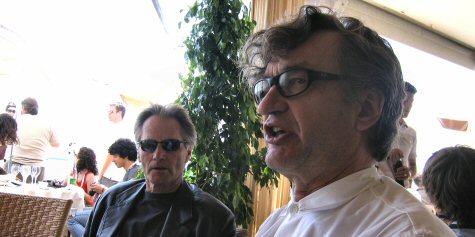
Don’t Come Knocking screenwriter-star Sam Shepard (left), director Wim Wenders at Sony Classics press luncheon at Carlton beach cafe — 5.20.05, 2:10 pm.
Wenders and screenwriter-star Sam Shepard last collaborated together on Paris, Texas (’84). That was a fairly strong, deservedly admired film, and I suppose they thought they could make lightning strike twice, or at least create a few meaningful sparks.
“We decided to fuck with it again,” Wenders said earlier today (5.20) during a press luncheon.
Like Jim Jarmusch’s Broken Flowers, Don’t Come Knocking is about a middle-aged guy on a downturn cycle facing up to all the crap in his life by reconnecting with a woman he used to love (or at least have sex with) in his youth, and also looking to find and perhaps get acquainted with a fully-grown son he never knew he had.
Trust me, Jarmusch’s film is a far, far better thing.
Shepard’s Howard Spence is an alcoholic, self-destructive actor who’s on his way down fast. The film begins with Howard hightailing if off the set of his latest film, a western being directed by a journeyman type in his late ’70s, played by George Kennedy.

This put me off right away. Guys who look like George Kennedy direct television shows…maybe. If they used to be feature directors and their rep carries some weight. But mostly they don’t direct anything because the industry discriminates against white-haired guys of this age, so right away I was saying to myself, “Bullshit.”
I also don’t find alcoholics the least bit interesting, especially ones who walk away from paying gigs for no discernible reason other than the fact that the screenwriter has decided the character is a fool who’s going through a midlife crisis.
Howard stays with his mother (Eva Marie Saint) for a while, who sees right through his bullshit boozy behavior but feels no need to call him on it. She provides the inciting incident, 45 minutes into the story, when she tells Howard that he has a son by Doreen (Jessica Lange), his ex-wife (or ex-girlfriend…not that it matters either way).
Howard makes his way up to Butte, Montana, and meets up with Lange, and she points out his son Earl (Gabriel Mann), a local country music performer.
Earl is black-haired and hugely pissed off and averse to emotional exposure of any kind, which means, of course, he doesn’t want to know Howard. He’s one of those guys given to throwing clothes and furniture out of his second-story apartment when emotions come to a boil.

Don’t Come Knocking costar Sarah Polley.
Howard’s mother has a scrapbook full of newspaper clippings about him, and his fame allows him to score with women he’s just met, but Earl, a 30 year-old, doesn’t know who he is. “What is he, an actor?” he says at one point.
The Cannes-based Hollywood Reporter critic wrote that Wenders and Shepard have yielded “a dry, spare, odd and oddly satisfying drama about a modern-day lonesome cowboy, lost in a desert of his own making, who seeks out salvation by seeking out those he left behind.”
Oddly satisfying? The movie is deeply aggravating. I was sitting there trying to decide when to leave. I wanted to see enough so I couldn’t be accused of missing most of it. I knew I was stuck there for a good 90 minutes or so, but I damn sure wasn’t going to sit through all 122 minutes’ worth.
To me, Knocking is not a Wim Wenders film. It doesn’t have his mood or visual signature or stylistic consistency.
It has an unfocused, shuffling-along attitude that feels way, way off. The script is sloppy and raggedy-assed, although there’s a good scene in which Lange tells off Shepard for being an irresponsible screwup.

Sony Classics honchos Michael Barker (l.) and Tom Bernard — 5.20.05, 1:20 pm.
I asked Wenders to respond to a comment about his film written by New York Times critic Manhola Dargis and published today, to wit: “This deeply sincere film takes place in an American West that bears little relation to the real world, perhaps because that isn’t the America with which [Wim] Wenders first fell in love.
“Like other artists and intellectuals from abroad, Mr. Wenders seems to have fallen for an America that mostly exists on Hollywood back lots and in rock ‘n’ roll lyrics, which probably explains why the romance has lasted so long.”
To this Wenders responded, “I have travelled around this country and gotten to know it better than any film critic I’ve ever met. I don’t think [Dargis] has ever been to Butte, Montana.”
I can’t write any more about this, but I had a swell time at the press luncheon and enjoyed speaking to Wenders and Shepard and costars Sarah Polley, Gabriel Mann and Fairuza Balk (who said I had “an interesting face,” which made me feel funny for some reason.)
I’m just sorry I had such a rough time with the film, and I’m hoping Wenders and Shepard do better next time.

Shepard, Wenders — 5.20.05, 2:05 pm.
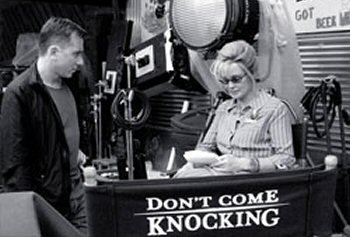
Don’t Come Knocking costars Tim Roth, Jessica Lange on set.

Exquisitely designed cappuccino cup, sipped from and remarked upon by Wim Wenders and yours truly during Knocking luncheon — 5.20.05, 2:20 pm.
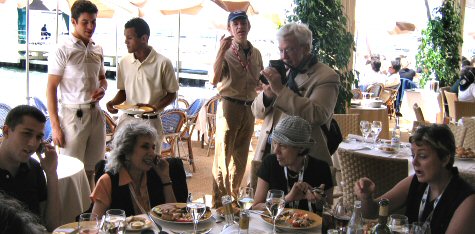
Roger Ebert (third from right, standing) snapping photos before start of Knocking luncheon. Variety critic Todd McCarthy (gesturing, wearing cap) stands to Ebert’s immediate right.
Respecting a Dead Guy
I’ve agreed not to wade into Tommy Lee Jones’ The Three Burials of Melquiades Estrada until 10:30 pm Thursday (Cannes time) and it’s only around 7 pm now, so I’ll have to write this a certain way.
I think it’s fair to say what other journos are saying, which is that they’re very admiring, and that some (like the Toronto Sun‘s Bruce Kirkland) are surprised at how smartly composed and compassionate and thematically rich it is.
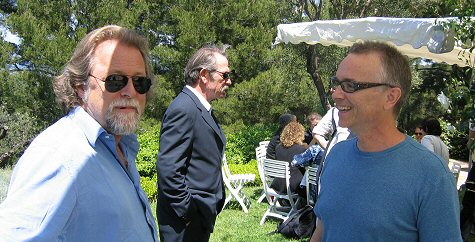
The Three Burials of Melquiades Estrada producer Michael Fitzgerald (left, avec beard), director-producer-star Tommy Lee Jones (center) and Toronto Sun critic-reporter Bruce Kirkland at Thursday’s press gathering at a wonderfully picturesque and soul-soothing villa in the hills above Cannes — 5.19.05, 12:35 pm.
Surprised because you never know what to expect from a first-time-out director **, especially when he’s a famous actor. It could have been indulgent or precious or half-baked.
But then Jones is a very intense, exceptionally bright, very passionate hombre, so his having scored with top-level journos shouldn’t be that surprising. Especially with Jones basing the film on an obviously thoughtful, time-shuffling script by Guillermo Arriaga, who wrote Amores Perros and 21 Grams.
I think it’s also fair to report that I attended an American Pavilion interview late Wednesday afternoon between Jones and Roger Ebert. Ebert made it clear he’d had a positive reaction to the film. He also asked if anyone in the audience had seen it, and when I raised my hand he asked me what I thought and I offered a thumbs-up gesture.
I don’t know if Melquiades Estrada is going to stand up against the supposed Palme D’Or favorites thus far, which are Michael Haneke’s Cache (which I missed last Saturday, and hasn’t, as far as I know, been shown since), David Cronenberg’s A History of Violence and Jim Jarmusch’s Broken Flowers.
It may (I say “may”) be received as more in the realm of being very good or worthy rather than masterful (there’s a prominent critic for a monthly who, according to a Texas-based critic, feels it falls apart during the second half), but I wouldn’t be surprised if the buzz is better than that.

The Three Burials of Melquiades Estrada costars Barry Pepper and January Jones at press table, as Pepper reads from a diary-journal he wrote during production. In it he described Tommy Lee Jones as “a Southern badass with a ruthless work ethic and a heart the size of the Copper Canyon.”
The Three Burials of Melquiades Estrada is a modern-day tale set in western Texas and northern Chihuahua, Mexico. It deals with a ranch foreman (Jones), a border patrolman (Barry Pepper) and an illegal immigrant named Melquiades Estrada who works for Jones. The second half is a horseback-journey film about redemption and seeing through prejudices and imbedded attitudes.
It’s a film with a great deal of compassion and soul and a generally humanistic view of things. If you want your literary influences, check out Flannery O’Connor’s work and William Faulkner’s “As I Lay Dying.”
In the press kit, Arriaga says he wanted “to make a study in social contrast between the land that’s south of the Rio Grande river and the land that’s north of it. About what iron ies, injustices, glory, beauty and redemption you can find in this area that has its own character…something that cannot be imposed, something that has grown and evolved… something that cannot be controlled.”
Just before 11 am today myself and a few other journos (Kirkland, Stephen Schaefer, Desson Thomson, Harlan Jacobson, Shari Roman, etc.) were driven in a minivan from the Gray d’Albion hotel near the Croisette into the hills above Cannes, and eventually (the driver got lost) to a beautiful hilltop villa.
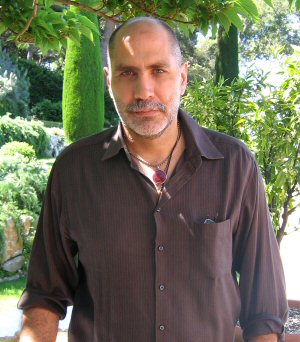
Guillermo Arriaga, hunting buddy of Tommy Lee Jones and screenwriter of The Three Burials of Melquiades Estrada (as well as 21 Grams and Amores Perros.
The purpose was to allow for a brief schmooze with Jones, Arriaga, Pepper, young co-star January Jones and producer Michael Fitzgerald (whose other ventures include Colour Me Kubrick and Sean Penn’s The Pledge).
Pepper said that Jones “has a very deep passion for strong visual composition and the poetry of words.” He read some passages from his on-set journal, and on one page he described Jones as “a Southern badass with a ruthless work ethic and a heart the size of the Copper Canyon.”
He mentioned two things that Jones told him before shooting a couple of scenes — “Keep it stupid simple” and “don’t do somethin’, just stand there.”
I mentioned to Jones, Arriaga and Fitzgerald that since seeing their film on Wednesday I’ve had trouble remembering the exact title. I like the earnest writerly sound of it — it doesn’t sound like your standard test-marketed title — but there is something about the name “Melquiades Estrada” that won’t stick in my brain, and I’m not trying to sound like a xenophobe when I say that.
Somebody asked Jones and Fitzgerald about the U.S. distribution prospects, and Jones said that “the wheels of commerce are turning as we speak.”
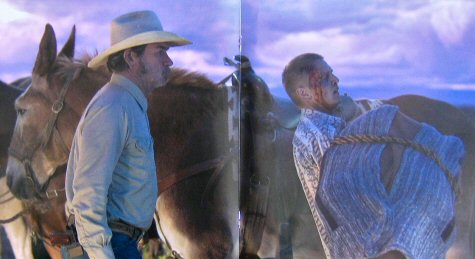
Tommy Lee Jones, Barry Pepper in scene from The Three Burials of Melquiades Estrada, taken straight from an image in press book (i.e. laid flat on the rug at the American Pavilion, and then cropped and refined).
Jones was asked to articulate the film’s themes, but he’s not what you’d call a press-junket gabber. Aside from calling it “a journey toward redemption,” he said, “You’re invited to read into it anything you deem appropriate…all you want, all you want.”
Pepper said that Jones read aloud from the book of Ecclesiastes during shooting. Jones was later asked why. “Because I like the book,” he replied.
His philosophy of directing actors, he said, is the same attitude he brings to handling a horse, which is “never ask a horse to do what it can’t do.”
Jones was asked what doesn’t work on the setas far as directing is concerned. “Tantrums are not constructive,” he said. “Egotism is not, I think, a good thing.”
He said he’s long wanted to direct a film of Cormac McCarthy’s “Blood Meridian,” and was asked a few years ago by then-Sony chief John Calley to write an adaptation of it in script form. He delivered it a year later but “they said it was too violent,” he said.

View of Cannes and the Med from EuropaCorp-rented villa, the site of Thursday’s press junket for The Three Burials of Melquiades Estrada.
The session ended after an hour or so, and everyone was driven back to town.
A journalist I spoke to near the front of the Gray d’Albion said I should have snapped a photo of January Jones when she was eating a banana at our press table. He was struck by this act of consumption for obvious reasons.
A wafer-thin and very beautiful brunette woman who does interviews for French TV sat next to me in the van on the way back. She was dressed in a sheer white dress and smelled like jasmine mixed with musk.
I glanced at a printed itinerary she was holding in her hand, and I saw that she had three hair and makeup appointments set for today — one at breakfast, a second just after lunch and a third before going out this evening.
Numbers
There is no more time at all…none…but the caption says it all. I’ll try and amplify tomorrow morning:

Screen International‘s poll of mostly European critics (and no Americans) still had Michael Haneke’s Cache (a.k.a. Hidden) at the top of the list of Palme d’Or contenders as of Wednesday, 5.18, in a graphic published in Thursday’s (5.19) issue. Notice that the Jim Jarmusch’s Broken Flowers is running a very close second. Tommy Lee Jones’ film was shown for the first time late Wednesday morning, and therefore didn’t figure. To what degree do these conclusions reflect the sympathies of the Palme d’Or jurors? I couldn’t say, but they do indicate what a lot of people I’ve spoken to myself are saying. Notice also that Pendre ou Faire L’Amour, which I walked out on, has the lowest ratings of all.
Beached!
I was taking a break yesterday (Thursday, 5.19) on the beach in front of the American Pavilion when I spotted two guys cruising along about 100 years out in the bay in some kind of watercar — an engine-driven car with tires and windshield wipers and everything else that floats and can be driven across the water.

Didn’t I see one of these in a James Bond film back in the early ’90s? Or in some Herbie or Love Bug remake from Disney?
Anyway, the two guys and their watercar started heading for the beach. Paddle, paddle…blub, blub, blub….so far, so good.

Then the tires hit the sand and they started spinning out. The slope of the beach is very gradual and slight, but the car couldn’t get any traction. They kept trying, accelerating, spitting water into the air ….failure.
The various onlookers on the beach began to laugh and joke with each other and point at the beached jalopy. Dumb invention! Back to the drawing board! How very quickly and suddenly the love and support of the public evaporates.

Fact
When I made my first trip to the Cannes Film Festival in ’92, topless women on the beach were a common sight. I used to love to stop for a minute or two and pretend to look at the water and sky and everything else except these women, and there were always several to gaze upon.

But nowadays it’s rare to see a bevy of women lying around topless. I noticed exactly two earlier today, and it’s very sunny and warm out. I think this signifies something. French culture is turning more covered and conservative, apparently…but why? This demands further thought. If anyone has any theories, please send them along.












